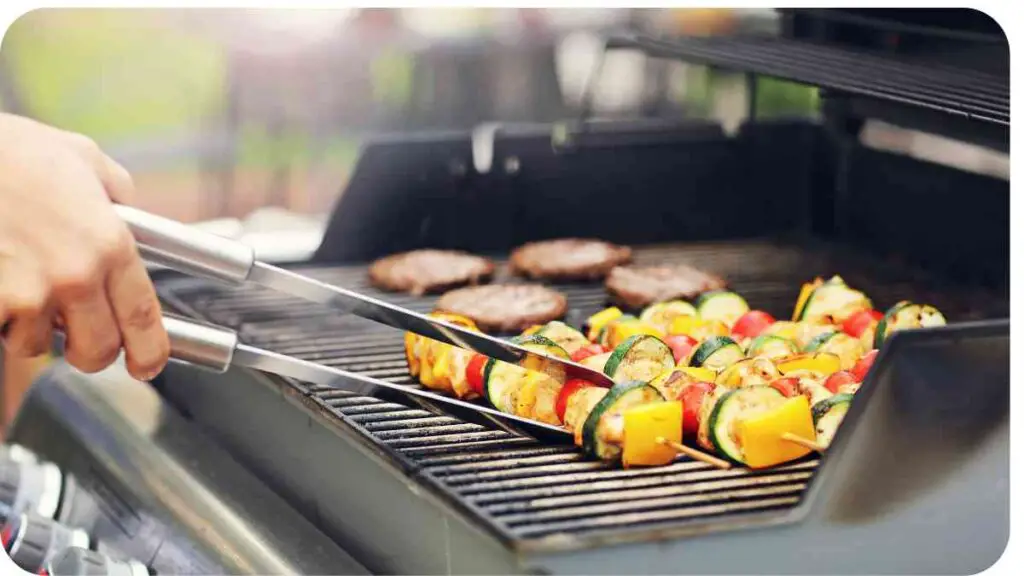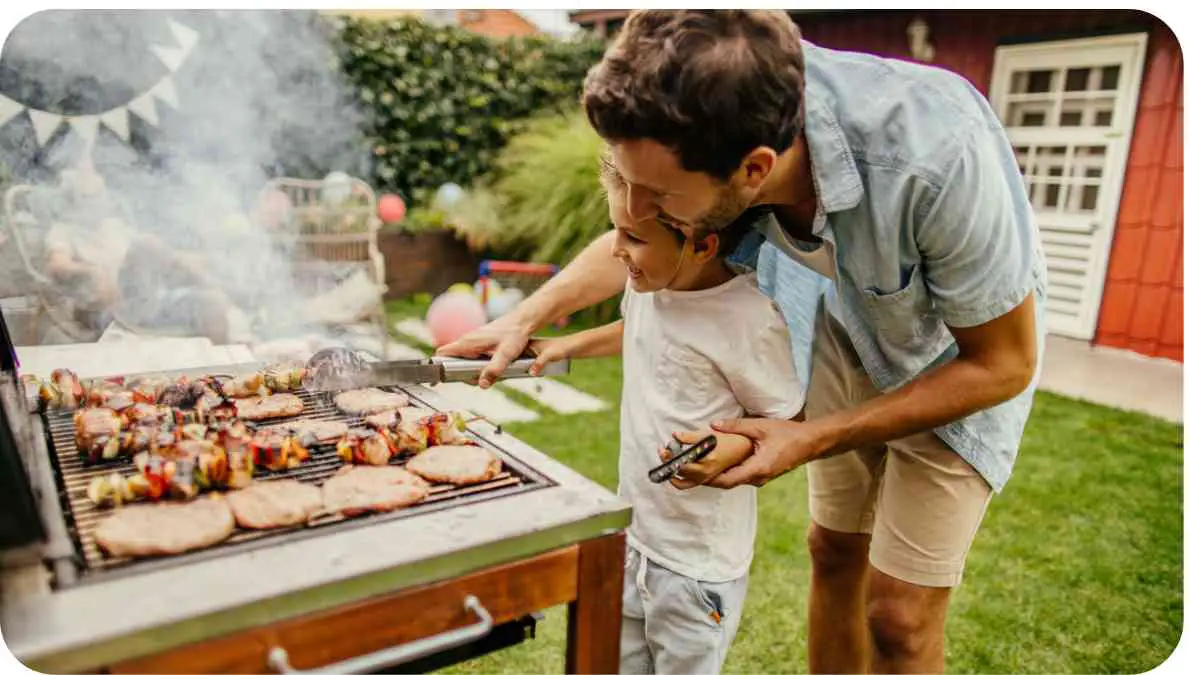As a professional blogger, I’ve written extensively on outdoor living and grilling. One question that frequently arises is, “Can I grill in my front yard?” The answer, as you might expect, is not a simple yes or no.
In this article, I’ll provide a detailed guide to help you understand the various factors that can influence whether or not you can grill in your front yard, as well as tips and best practices for front yard grilling.
Let’s dive into the world of front yard grilling and explore the many considerations that can impact your ability to enjoy this popular outdoor cooking activity.
| Key Takeaways |
|---|
| Check local regulations before grilling in your front yard |
| Consider the impact of your grilling on your neighbors |
| Follow grilling safety tips and best practices |
| Choose the right grill for your front yard |
| Maintain a clean and neighbor-friendly grilling space |
| Minimize smoke and odor impacts on your neighbors |
| Follow grilling etiquette to foster good neighbor relations |
| Consider alternative grilling spaces and solutions if front yard grilling is not possible |
| Consider DIY grilling projects for a custom grilling solution |
| Find space-saving solutions for grilling in small front yards |
Understanding Local Grilling Regulations

Before you fire up the grill in your front yard, it’s essential to familiarize yourself with your local grilling regulations. These regulations can vary significantly from one state to another, and even from one city to the next. Some areas may have strict rules about grilling in the front yard, while others may have no restrictions at all.
To help you get started, I’ve compiled a table of common grilling regulations by state. Keep in mind that these regulations may not apply to your specific city or municipality, so be sure to check with your local authorities for the most accurate information.
Transforming your front yard into an inviting space can significantly enhance your home’s curb appeal. For inspiration on how to make the most of your outdoor area, check out these ideas for outdoor enjoyment, which include creative tips and practical advice.
Table 1: Common Grilling Regulations by State
| State | Grilling Regulations |
|---|---|
| California | No statewide regulations, but local ordinances may apply |
| Florida | No statewide regulations, but local ordinances may apply |
| New York | No statewide regulations, but local ordinances may apply |
| Texas | No statewide regulations, but local ordinances may apply |
| Illinois | No statewide regulations, but local ordinances may apply |
| Pennsylvania | No statewide regulations, but local ordinances may apply |
| Ohio | No statewide regulations, but local ordinances may apply |
As you can see, the majority of states do not have statewide grilling regulations. Instead, grilling rules are typically determined by local authorities, such as city councils or homeowners associations. In some cases, these regulations may be quite specific, outlining requirements for grill types, distances from structures, and even the use of specific grilling fuels.
Grilling in the City vs. Suburbs vs. Rural Areas

The location of your home can also impact your ability to grill in your front yard. In general, grilling regulations and restrictions tend to be more stringent in densely populated urban areas, where homes are closer together and fire hazards are a greater concern.
Before making any major changes to your front yard, such as adding a driveway, it’s essential to consider local regulations and potential impact. Learn more about the process and requirements by reading can I build a driveway to ensure a smooth project.
Here’s a breakdown of grilling restrictions by location:
Table 2: Grilling Restrictions by Location
| Location | Typical Grilling Restrictions |
|---|---|
| Urban Areas | May require permits, specific grill types, and distance from structures. |
| Suburbs | May have fewer restrictions than urban areas, but still subject to local ordinances. |
| Rural Areas | Often have the fewest restrictions, but may still require adherence to local fire codes. |
In urban areas, where homes are often close together, fire safety is a significant concern. As a result, grilling regulations may be more stringent, requiring permits, specific grill types, and a minimum distance from structures.
In suburban areas, grilling regulations may be less strict, but still subject to local ordinances. In many cases, grilling in the front yard may be allowed, as long as you follow general safety guidelines and adhere to any applicable local regulations.
Grilling Safety Tips and Best Practices
Regardless of where you live, it’s essential to prioritize safety when grilling in your front yard. Here are some tips and best practices to help you grill safely:
Table 3: Safety Tips for Grilling in Your Front Yard
| Tip | Details |
|---|---|
| Choose a safe location | Keep your grill at least 10 feet away from your house and any other structures, such as fences or trees. |
| Keep the grill stable | Make sure your grill is on a stable, level surface to prevent tipping. |
| Use the right fuel | Always use the appropriate fuel for your grill, whether it’s propane, natural gas, or charcoal. |
| Maintain your grill | Regularly clean your grill and check for leaks, rust, or other damage. |
| Never leave the grill unattended | Always stay near the grill while it’s in use, and never leave children or pets unsupervised. |
| Have a fire extinguisher on hand | Keep a fire extinguisher nearby in case of emergencies. |
By following these safety tips and best practices, you can minimize the risk of accidents and ensure a safe and enjoyable grilling experience in your front yard.
Choosing the Right Grill for Your Front Yard

When it comes to grilling in your front yard, the type of grill you choose can make a big difference. Different grills have different features, benefits, and drawbacks, so it’s important to choose the one that best suits your needs and circumstances.
Adding a trampoline can provide fun and exercise for your family, but it’s important to be aware of safety and zoning laws. Find out more in this article about putting a trampoline in your front yard to make an informed decision.
Here’s a table outlining the various types of grills and their suitability for front yard grilling:
Table 4: Types of Grills and Their Suitability for Front Yard Grilling
| Type of Grill | Suitability for Front Yard Grilling |
|---|---|
| Charcoal Grills | May produce more smoke and require more cleanup, but can be a good option for those who prefer the traditional grilling experience. |
| Gas Grills | Provide quick and easy heat, but can be more expensive and may require a natural gas line or propane tank. |
| Electric Grills | Offer minimal smoke and easy cleanup, but may not provide the same flavor as charcoal or gas grills. |
| Portable Grills | Compact and easy to move, but may not have the same performance or features as larger grills. |
When choosing a grill for your front yard, consider factors such as your budget, the size of your space, and your personal preferences. Keep in mind that some grills may be more appropriate for certain locations, such as gas grills for urban areas or charcoal grills for rural areas.
Maintaining a Clean and Neighbor-Friendly Grilling Space
When grilling in your front yard, it’s essential to maintain a clean and neighbor-friendly space. This not only helps keep your yard looking its best but also minimizes the impact on your neighbors and the environment.
Here are some tips for maintaining a clean and neighbor-friendly grilling space:
Table 5: Tips for Maintaining a Clean and Neighbor-Friendly Grilling Space
| Tip | Details |
|---|---|
| Clean up after grilling | Always clean up your grill and the surrounding area after each use. |
| Minimize smoke and odor | Use a grill that produces minimal smoke and odor, or consider grilling techniques that reduce smoke, such as using a smoker box or indirect grilling. |
| Respect your neighbors | Be considerate of your neighbors by keeping noise to a minimum and avoiding grilling during late hours. |
| Dispose of waste properly | Dispose of grilling waste, such as charcoal and ashes, in a safe and environmentally friendly manner. |
By following these tips, you can help ensure that your front yard grilling experience is enjoyable for both you and your neighbors.
Dealing with Smoke and Odor Concerns
One of the most common concerns when grilling in the front yard is the potential for smoke and odor to affect your neighbors. Fortunately, there are several strategies you can use to minimize these impacts.
Here are some strategies to minimize smoke and odor from front yard grilling:
Considering constructing a garage in your front yard? This project can increase storage and protect your vehicles, but it’s crucial to check zoning regulations first. Discover the steps and considerations for building a garage in the front garden for detailed guidance.
Table 6: Strategies to Minimize Smoke and Odor from Front Yard Grilling
| Strategy | Details |
|---|---|
| Choose a grill with low smoke output | Opt for a grill that produces minimal smoke, such as an electric or gas grill. |
| Use indirect grilling techniques | Indirect grilling involves placing the food away from the direct heat source, which can help reduce smoke. |
| Use a smoker box | A smoker box is a small metal container that you can fill with wood chips to add smoky flavor to your food without producing excessive smoke. |
| Grill at the right time | Avoid grilling during peak hours, when smoke and odor may be more noticeable to your neighbors. |
By employing these strategies, you can help minimize the impact of smoke and odor on your neighbors and the surrounding environment.
Grilling Etiquette and Neighbor Relations

When grilling in your front yard, it’s essential to be considerate of your neighbors and maintain good relations. Here are some tips for grilling etiquette to foster good neighbor relations:
Table 7: Grilling Etiquette to Foster Good Neighbor Relations
| Tip | Details |
|---|---|
| Be mindful of noise | Keep noise levels to a minimum, especially during late hours. |
| Be considerate of smoke and odor | Use the strategies outlined above to minimize smoke and odor impacts on your neighbors. |
| Respect property lines | Keep your grilling activities within your own property lines and avoid encroaching on your neighbors’ space. |
| Communicate with your neighbors | Let your neighbors know when you plan to grill and be open to discussing any concerns they may have. |
By following these grilling etiquette tips, you can help maintain good relations with your neighbors and ensure a positive grilling experience for everyone involved.
Legal Considerations: Permits and Liabilities
Before you start grilling in your front yard, it’s important to be aware of any legal considerations, such as permits and liabilities. Depending on where you live, you may need to obtain a permit to grill in your front yard, or you may be subject to specific liability concerns.
Here’s an overview of legal considerations for front yard grilling:
Table 8: Overview of Legal Considerations for Front Yard Grilling
| Legal Consideration | Details |
|---|---|
| Permits | Some localities may require a permit to grill in your front yard. Check with your local authorities to determine if a permit is necessary. |
| Liability | You may be liable for any damages or injuries that result from your grilling activities. Ensure that you have adequate insurance coverage to protect yourself and your property. |
| Property regulations | If you live in a homeowners association (HOA) or a rental property, there may be specific regulations regarding grilling in the front yard. Consult your HOA or landlord for more information. |
By familiarizing yourself with these legal considerations, you can ensure that you’re grilling in your front yard in compliance with local regulations and with appropriate protections in place.
If your front lawn has seen better days, resodding might be the best solution to rejuvenate it. Understand the costs involved and factors affecting the project by exploring how much does it cost for a well-informed approach to lawn care.
Alternatives to Front Yard Grilling
If you’ve determined that grilling in your front yard is not a viable option, there are still several alternatives you can consider. Here are some alternative grilling spaces and solutions:
Table 9: Alternative Grilling Spaces and Solutions
| Alternative | Details |
|---|---|
| Backyard Grilling | If you have a backyard, this is often the most convenient and practical solution for grilling. |
| Community Grilling Spaces | Some communities offer shared grilling spaces, such as parks or clubhouses, where you can grill without impacting your neighbors. |
| Portable Grills | Portable grills, such as tabletop or tailgating grills, can be a great option for those with limited space or who want the flexibility to grill in different locations. |
| Indoor Grilling | If outdoor grilling is not an option, consider using an indoor grill or grill pan to achieve similar results. |
By exploring these alternatives, you can find a grilling solution that works for you and your specific circumstances.
DIY Grilling Projects for Your Front Yard
If you’re handy and looking for a fun and creative way to incorporate grilling into your front yard, consider a DIY grilling project. Here are some DIY grilling projects for your front yard:
Table 10: DIY Grilling Projects for Your Front Yard
| Project | Details |
|---|---|
| Brick Grill | Build a custom brick grill in your front yard for a permanent and attractive grilling solution. |
| Grilling Station | Create a grilling station that incorporates storage and counter space, making it easy to prep and cook your food. |
| Fire Pit Grill | Transform a fire pit into a multi-purpose grilling and gathering space for your front yard. |
| Portable Grill Cart | Build a custom cart for your portable grill, making it easy to move and store your grill as needed. |
By taking on a DIY grilling project, you can create a custom grilling solution that meets your specific needs and enhances your front yard.
Grilling in Small Front Yards: Space-Saving Solutions
If you have a small front yard, you may think that grilling is not an option. However, with some creative thinking, you can still enjoy the benefits of grilling in your front yard. Here are some space-saving solutions for grilling in small front yards:
Table 11: Space-Saving Grilling Solutions for Small Front Yards
| Solution | Details |
|---|---|
| Portable Grills | Portable grills, such as tabletop or tailgating grills, are a great option for small front yards, as they can be easily stored when not in use. |
| Vertical Grilling | Consider using a vertical grill, which takes up less space than a traditional grill and can be mounted on a wall or fence. |
| Multi-Purpose Furniture | Invest in multi-purpose furniture, such as a grill table or bench, that can serve as both a grilling surface and seating area. |
| Collapsible Grills | Collapsible grills, such as those made from stainless steel or aluminum, can be easily stored when not in use, making them an ideal solution for small front yards. |
By implementing these space-saving solutions, you can enjoy the benefits of grilling in your small front yard without sacrificing valuable space.
Conclusion
In conclusion, the question of whether or not you can grill in your front yard is not a simple one. The answer depends on a variety of factors, including local regulations, location, grill type, and personal preferences.
By following the tips and guidelines outlined in this article, you can determine whether front yard grilling is right for you and, if so, how to do it safely and responsibly. From understanding local regulations to choosing the right grill and maintaining a clean and neighbor-friendly grilling space, there are many considerations to keep in mind.
By taking the time to educate yourself and make informed decisions, you can enjoy the many benefits of grilling in your front yard, from delicious meals to quality time with family and friends. So fire up the grill, grab a cold drink, and enjoy the joys of front yard grilling!
Further Reading
- Front Yard Grilling Discussion: A forum thread discussing the pros and cons of grilling in your front yard.
- Curious Front Yard Cooking: A thread discussing the experiences of those who have grilled in their front yards.
- Is Front Yard Grilling Legal?: A discussion on the legality of grilling in your front yard.
FAQs
Can I grill in my front yard?
The answer depends on a variety of factors, including local regulations, location, grill type, and personal preferences. Be sure to check with your local authorities and follow the guidelines outlined in this article to determine whether front yard grilling is right for you.
What type of grill is best for front yard grilling?
The best type of grill for front yard grilling depends on your specific circumstances and preferences. Consider factors such as budget, space, and the type of fuel you prefer when choosing a grill.
How can I minimize the impact of smoke and odor on my neighbors?
There are several strategies you can use to minimize the impact of smoke and odor on your neighbors, such as choosing a grill with low smoke output, using indirect grilling techniques, and grilling at the right time.
What are some alternatives to front yard grilling?
If front yard grilling is not a viable option, there are several alternatives you can consider, such as backyard grilling, community grilling spaces, portable grills, and indoor grilling.
How can I maintain good relations with my neighbors when grilling in my front yard?
To maintain good relations with your neighbors, be considerate of their needs and concerns, communicate openly, and follow grilling etiquette guidelines.

Hi! My name is Hellen James, and I’m here to help you with your home-maintenance needs. Whether it’s building a better yard or just trying to fix a garden—I can show you how.


